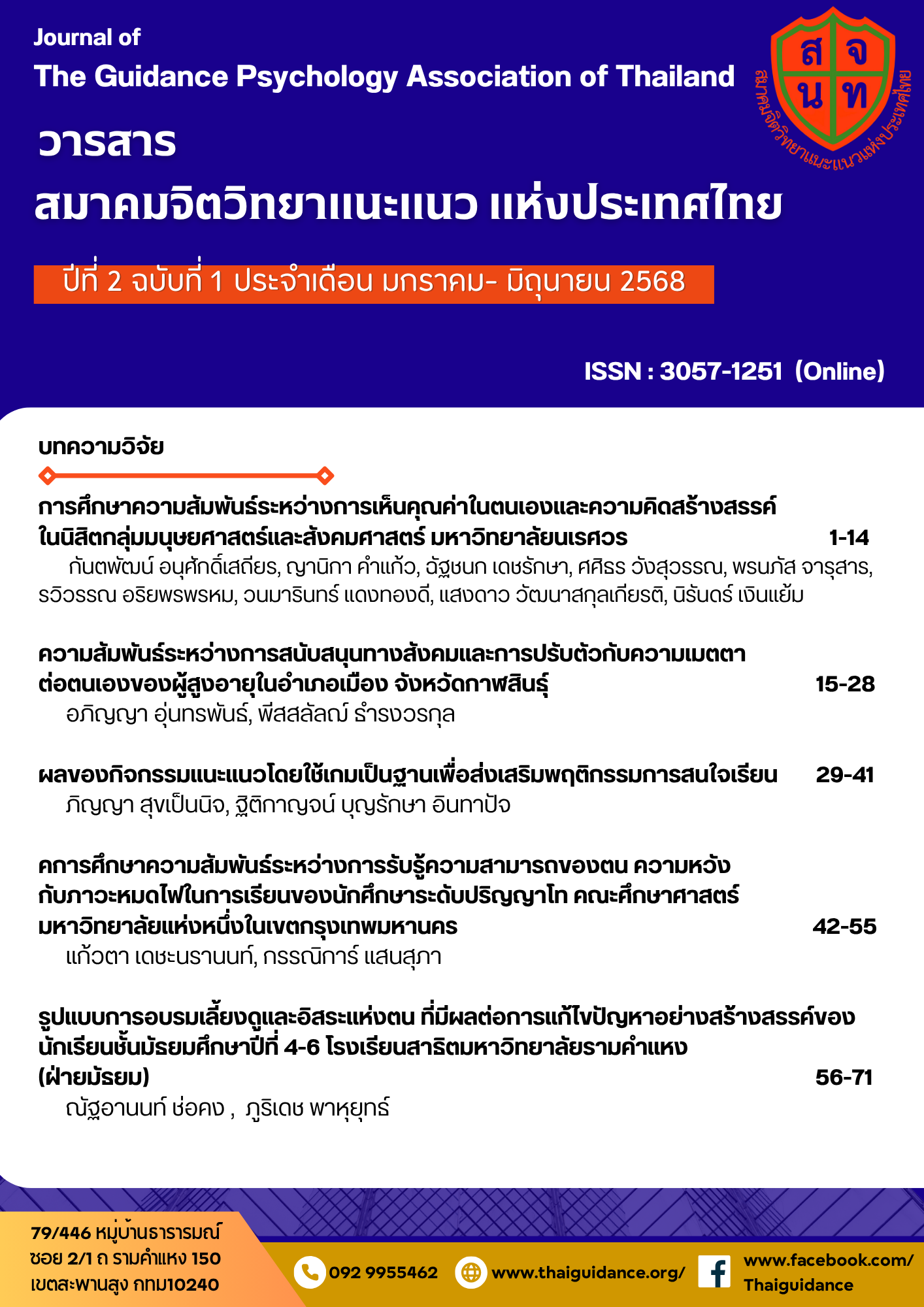รูปแบบการอบรมเลี้ยงดูและอิสระแห่งตน ที่มีผลต่อการแก้ไขปัญหาอย่างสร้างสรรค์ของนักเรียนชั้นมัธยมศึกษาปีที่ 4-6 โรงเรียนสาธิตมหาวิทยาลัยรามคำแหง(ฝ่ายมัธยม)
คำสำคัญ:
รูปแบบการอบรมเลี้ยงดู, อิสระแห่งตน, การแก้ไขปัญหาอย่างสร้างสรรค์บทคัดย่อ
การวิจัยนี้มีวัตถุประสงค์ เพื่อ 1)ศึกษารูปแบบการอบรมเลี้ยงดู ระดับอิสระแห่งตน และการแก้ไขปัญหาอย่างสร้างสรรค์ของนักเรียนชั้นมัธยมศึกษาปีที่ 4-6 โรงเรียนสาธิตมหาวิทยาลัยรามคำแหง (ฝ่ายมัธยม) 2) ศึกษาความสัมพันธ์ของตัวแปรดังกล่าว 3) ศึกษาอิทธิพลของปัจจัยที่มีผลต่อการแก้ไขปัญหาอย่างสร้างสรรค์ของนักเรียน เครื่องมือที่ใช้ในการวิจัย คือ แบบสอบถามข้อมูลส่วนบุคคล แบบสอบถามรูปแบบการอบรมเลี้ยงดู แบบวัดอิสระแห่งตน และแบบวัดการแก้ไขปัญหาอย่างสร้างสรรค์ ผลการศึกษา พบว่ารูปแบบการอบรมเลี้ยงดูที่มีระดับสูงที่สุดคือการอบรมเลี้ยงดูแบบเอาใจใส่ (ค่าเฉลี่ย = 3.60) ส่วนระดับอิสระแห่งตนและการแก้ไขปัญหาอย่างสร้างสรรค์อยู่ในระดับปานกลาง (ค่าเฉลี่ย = 3.34 และ 3.45 ตามลำดับ) การวิเคราะห์ความสัมพันธ์ระหว่างรูปแบบการอบรมเลี้ยงดู อิสระแห่งตน และการแก้ไขปัญหาอย่างสร้างสรรค์ พบว่า มีเพียงรูปแบบการอบรมเลี้ยงดูแบบทอดทิ้งเท่านั้นที่ไม่มีความสัมพันธ์กับการแก้ไขปัญหาอย่างสร้างสรรค์ การวิเคราะห์อิทธิพล พบว่ารูปแบบการอบรมเลี้ยงดูแบบควบคุมและอิสระแห่งตนมีอิทธิพลต่อการแก้ไขปัญหาสร้างสรรค์ โดยผลจากการวิเคราะห์การถดถอยพหุคูณ (Multiple Regression) แสดงว่า รูปแบบการอบรมเลี้ยงดูแบบควบคุม และอิสระแห่งตน ทั้งอิสระแห่งตนด้านพฤติกรรม และด้านความคิดสามารถพยากรณ์การแก้ไขปัญหาอย่างสร้างสรรค์ได้อย่างมีนัยสำคัญทางสถิติ (p < 0.05) ดังสมการที่ได้จากการวิเคราะห์ สรุปได้ว่า รูปแบบการอบรมเลี้ยงดูและอิสระแห่งตนมีผลสำคัญต่อการส่งเสริมความสามารถในการแก้ไขปัญหาอย่างสร้างสรรค์ของนักเรียน
เอกสารอ้างอิง
เสรี ใหม่จันทร์. (2553). การวิเคราะห์องค์ประกอบและการเสริมสร้างอิสระแห่งตนของนักเรียนวัยรุ่น โดยการให้คำปรึกษากลุ่ม (ปริญญาการศึกษาดุษฎีบัณฑิต). กรุงเทพฯ: มหาวิทยาลัยศรีนครินทร์วิโรฒ.
สำนักงานสภาพัฒนาการเศรษฐกิจและสังคมแห่งชาติ. (2565 ). แผนพัฒนาเศรษฐกิจและสังคมแห่งชาติ ฉบับที่ 13 (พ.ศ. 2566—2570). ราชกิจจานุเบกษา. 143. https://www.ratchakitcha.soc.go.th/DATA/PDF/2565/E/258/T_0001.PDF
พรรณทิพย์ ศิริวรรณบุศย์, ธีระพร อุวรรณโณ, เพ็ญพิไล ฤทธาคณานนท์ และคณะ (2545). การศึกษารูปแบบ ความสัมพันธ์ระหว่างพฤติกรรมของคนไทยกับกระบวนการทางสังคมประกิตของครอบครัวในปัจจุบันที่เอื้อต่อการพัฒนาประเทศ. กรุงเทพฯ: จุฬาลงกรณ์มหาวิทยาลัย.
Baumrind, D. (1971). Current patterns of parental authority. Developmental Psychology, 4(1, Pt.2), 1–103. https://doi.org/10.1037/h0030372
Beckert, T. E. (2005). Fostering Autonomy in Adolescents: A Model of Cognitive Autonomy and Self-evaluation. Utah State University [Paper presented at the American Association of Behavioral and Social Sciences].
Dworkin, G. (1988). The Theory and Practice of Autonomy. Cambridge, UK: Cambridge University Press. http://dx.doi.org/10.1017/CBO9780511625206
Fernando, S., Ileana, M., Andre, W., et al., (2013). Learning from Failure: A Case Study on Creative Problem Solving. Procedia-Social and Behavioral Sciences, 75, 570-580. https://doi.org/10.1016/j.sbspro.2013.04.062
Hashem, W. A. A., Abdelaziz, E. M., Mohammed, S., et al., (2024). Problem Solving Skills and Its Relation to Parental Authority Among Technical Secondary Schools Students. Menoufia Nursing Journal Faculty of Nursing Menoufia University, 9(1), 277-291. https://doi.org/10.21608/MENJ.2024.354765
Khanum, S., Mushtaq, R., Kamal, M. D., et al., (2023). The Influence of Parenting Styles on Child Development. Journal of Policy Research, 9(2), 808–816. https://doi.org/10.61506/02.00022
Mehrinejad, S. A., Rajabimoghadam, S., & Tarsafi, M. (2015). The Relationship between Parenting Styles and Creativity and the Predictability of Creativity by Parenting Styles. Procedia - Social and Behavioral Sciences, (205), 56-60. https://doi.org/10.1016/j.sbspro.2015.09.014
Mele, A. R. (2001). Autonomous Agents: From Self-Control to Autonomy. Oxford: Oxford University Press. https://doi.org/10.1093/0195150430.001.0001.
Noom, M. J. (1999). Adolescent Autonomy: Characteristics and Correlates [Thesis]. Delft: Eburon Publishers.
Noom, M. J., Dekovic, M., & Meeus, W. H. (2001). Conceptual Analysis and Measurement of Adolescent Autonomy. Journal of Youth and Adolescence., 30(5), 577-595. https://doi.org/10.1023/A:1010400721676
Önder, A., & Gülay, H. (2009). Reliability and validity of parenting styles and dimensions questionnaire. Procedia - Social and Behavioral Sciences, 1(1), 508-514. https://doi.org/10.1016/j.sbspro.2009.01.092
Perry, N. B., Dollar, J. M., Calkins, S. D., et al. (2018). Childhood Self-Regulation as a Mechanism Through Which Early Overcontrolling Parenting Is Associated with Adjustment in Preadolescence. American Psychological Association, 54(8), 1542–1554. https://doi.org/http://dx.doi.org/10.1037/dev0000536
Russell, S., & Bakken, R. J. (n.d.). Development of Autonomy in Adolescence. Basicknowledge101.https://www.basicknowledge101.com/pdf/Development%20of%20Autonomy%20in%20Adolescence.pdf.
Ryan, R. M., & Deci, E. L. (2006). Self-regulation and the problem of human autonomy: Does psychology need choice, self-determination, and will. Journal of Personality, 74(6), 1557-1586. https://doi.org/10.1111/j.1467-6494.2006.00420.x
Salam, A., & Miriam, S. (2018). Teaching Problem-solving Skills Through Learner Autonomy Based Learning and Local Wisdom Insight. Advances in Social Science, Education and Humanities Research (ASSEHR), 147. https://doi.org/10.2991/icsse-17.2018.1
Schroeder, R. D., Bulanda, R. E., Giordano, P. C., et al. (2010). Parenting and adult criminality: An examination of direct and indirect effects by race. Journal of Adolescent Research, 25(1), 64–98. https://doi.org/10.1177/0743558409354215
Treffinger, D. J. (1995). Creative Problem Solving: Overview of education implications. Education Psychology Review, 7(3), 301 –312. https://doi.org/10.1007/BF02213375
Treffinger, D. J., & Isaksen, S. G. (2005). Creative Problem Solving: The History, Development, and Implications for Gifted Education and Talent Development. Gifted Child Quarterly, 49(4), 342 –353. https://doi.org/10.1177/001698620504900407.
Treffinger, D. J., Isaksen, S. G., & Dorval, B. (2005). Creative Problem Solving: An Introduction (4th ed.). Prufrock Press Inc.
ดาวน์โหลด
เผยแพร่แล้ว
รูปแบบการอ้างอิง
ฉบับ
ประเภทบทความ
สัญญาอนุญาต
ลิขสิทธิ์ (c) 2025 สมาคมจิตวิทยาแนะแนวแห่งประเทศไทย

อนุญาตภายใต้เงื่อนไข Creative Commons Attribution-NonCommercial-NoDerivatives 4.0 International License.
บทความที่ได้รับการตีพิมพ์เป็นลิขสิทธิ์ของ สมาคมจิตวิทยาแนะแนวแห่งประเทศไทย
ข้อความที่ปรากฏในบทความแต่ละเรื่องในวารสารวิชาการเล่มนี้เป็นความคิดเห็นส่วนตัวของผู้เขียนแต่ละท่านไม่เกี่ยวข้องกับสมาคมจิตวิทยาแนะแนวแห่งประเทศไทย และบุคลากรท่านอื่น ๆ ใน สมาคมฯ แต่อย่างใด ความรับผิดชอบองค์ประกอบทั้งหมดของบทความแต่ละเรื่องเป็นของผู้เขียนแต่ละท่าน หากมีความผิดพลาดใดๆ ผู้เขียนแต่ละท่านจะรับผิดชอบบทความของตนเองแต่ผู้เดียว



